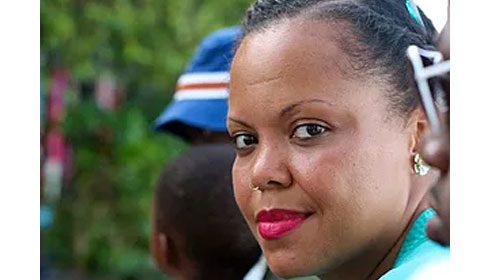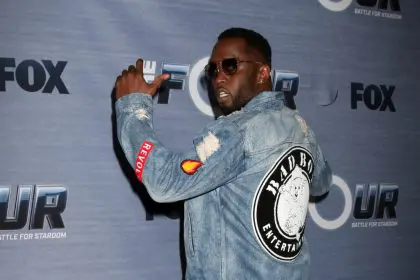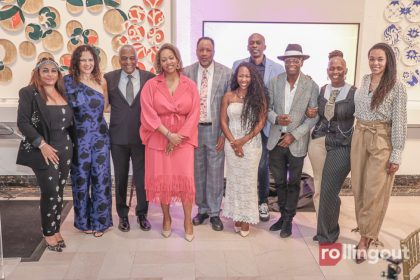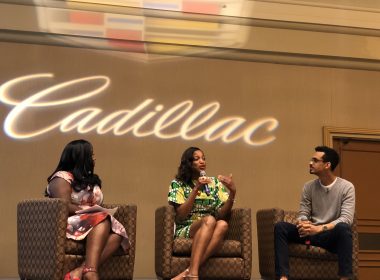
Emmy Award-winning Shaun Robinson may be best known for her 15-plus year run as the daily entertainment TV host of “Access Hollywood,” but the Detroit native is just getting started with another segment of her career as she recently launched the S.H.A.U.N. Foundation for Girls in Detroit. The Spelman College alum’s launch event was held at the Charles H. Wright Museum of African American History, and she partnered with the Ford Motor Company Fund. During her launch event she tackled the issue of human sex-trafficking and moderated a very diverse panel of professional women that included experts, authors, civic leaders, and sex trafficking survivors.
Pamela Alexander, director of community development, Ford Motor Company Fund, expressed excitement about the partnership. “Since we were founded, we’ve been about empowering young people, young women to realize their dreams, and sometimes that empowerment takes on the form of scholarships as we give millions of dollars in scholarships every year. But it’s also about empowering young girls in other areas that are important, and in this case it’s safety. In choosing Alternatives for Girls as our partner, they play such a critical role in our community in empowering girls, but also in helping them to be safe and to help them move forward as adults,” she said.

“Shaun Robinson is a native Detroiter that always comes home, and I think it says a lot about her commitment to the Detroit community that she chose to launch her foundation here. So, we’re really excited to partner with Shaun on her new foundation and, of course, to recognize and work with Alternative for Girls who we’ve partnered with for some time now,” Alexander adds.
Rolling out sat down exclusively with Robinson to ask her why she decided to launch a foundation, and to discuss her launch event “The Empowered Girl: How Not to Be a Victim of Human Trafficking,” which touched on the importance of speaking out against sex-trafficking. Check out the interview below and let us know what you think in the comments section.

Why did you decide to launch a foundation for girls at this point in your career?
I’ve long had a platform for female empowerment. I wrote a book in 2009 on girls and self esteem called Exactly as I Am. I also started an online movement, called One Girl, One Voice, A Million ways to Make a Difference. That launched about five years ago, and it encourages girls to talk about their volunteer work. And how that connects to self-esteem is the quickest way to true self-esteem is to take the attention away from yourself and to put it on people who are less fortunate. So, girls were encouraged to talk about their volunteer work. I also sit on the board of two girls empowerment organizations. I sat for three terms on the board of directors for Girls, Inc. and I also sit on the NASA advisory council for Girls Up which is under the United Nations Foundation. So, it’s long been a platform of mine. I’ve been wanting to do my own foundation for years and I was so very busy and I said you know what, now is the time, and I just really need to do this now.
Your foundation is named the S.H.A.U.N. Foundation. It’s an acronym for your name. Tell us what does the acronym stand for?
I just launched the foundation two weeks ago, and it’s been absolutely incredible. The basis of the foundation is this: It’s called the S.H.A.U.N. Foundation for girls, and I wanted to cast the net wide and help as many girls as possible. So, I kind of modeled it after the Bill and Melinda Gates Foundation, whereas they are a grant making foundation, and my organization is a grant making foundation. We seek out those small non-profits that are grass root non-profits that are doing work in five key areas of girls issues. And those five key areas are represented by the acronym of my name SHAUN. So, S is for STEM — science, technology, engineering and math. H is for health. A is arts. U is unity, bridging girls here with girls across the world. And N is neighborhoods, helping girls in underserved neighborhoods. And as far as the first initiative, I wanted it to be in my hometown of Detroit, in the city that I love and I grew up in.
Tell us about your event, The Empowered Girl: How Not to Be a Victim of Human Trafficking.
So, I identified an organization here [in Michigan] called Alternatives for Girls. And one of the things that they do is they help rescue girls and young women from sex trafficking, and they are a phenomenal organization. The S.H.A.U.N. Foundation for Girls is giving a grant to Alternatives for Girls. And more than just a grant presentation, I wanted it to be a conversation, I wanted the event to be bigger. So, what we’re doing is we’re having a panel discussion of all women, and women who are in the forefront of eradicating human trafficking. We’re going to have an audience of women, young girls and their parents, so we can talk about this epidemic that is threatening and ravaging our community in a sister-to-sister safe setting. Michigan has a major problem with sex-trafficking, and so many girls are at risk, so we are going to have a panel of women who really care about this issue and are doing everything they can to combat this issue. So, we have Councilwoman Mary Sheffield, we have Judge Deborah Thomas, we have two representatives from Alternatives for Girls, we also have three women who are survivors of sex trafficking. They are telling their stories about their days when they were forced to do these horrendous things. They’re talking to the girls because they feel like they’ve got to do something about this. So, they want the girls to hear their stories in hopes that something they say will help them avoid being in the same position.
When teenage girls are missing or just disappear — and we see stories like that quite a bit — could they be victims of human sex trafficking?
There’s this perception that girls who are victims of sex trafficking, either they’ve been kidnapped, and held against their will, or it’s the woman standing out on the street corner, but the fact of the matter is many girls who are victims of sex trafficking, they may live at home with their parents. They go to school and they may be forced to have to perform these sex acts after school, and then they go back home with their parents and do their homework and their parents have no idea. These perpetrators are luring girls online through social media sites, they’re going on college campuses where girls are, and they’re luring them into this life. And a lot of girls are doing it from their own house, meaning, they live at home and they’re going out and doing it. And sometimes, they may be doing it because they want to get their hair done and their nails done, and buy the latest bag, and they’re thinking ‘I can make some extra money’. Here’s the thing, if you are under 18 and somebody is paying you to have sex, and you’re giving that money to somebody, you are a victim of sex trafficking, period. No matter where it happens. And sometimes girls are luring their girlfriends into this lifestyle.
How did you connect with Alternatives for Girls to even do this initiative?
One of the things that we are trying to do with this foundation is to identify those organizations that are doing great work. We don’t know where all the world’s inequities are, but we’re going to seek out those people who do know and try to help them continue their mission. I had no idea before I started researching this that sex trafficking was a big problem in Michigan. So, I was so glad I found this organization. It was surprising and it was a very eye-opening experience after I started talking to them and finding out about the work they were doing.
Long term, what does success look like for you and your organization?
That’s a good question. Success for me looks like having impacted dozens of foundations around the country that are doing work in the areas of improving the lives of girls in about a year. That’s really my goal, to identify as many organizations as possible that are doing good work, and help them succeed. That’s what success would look like for me.












